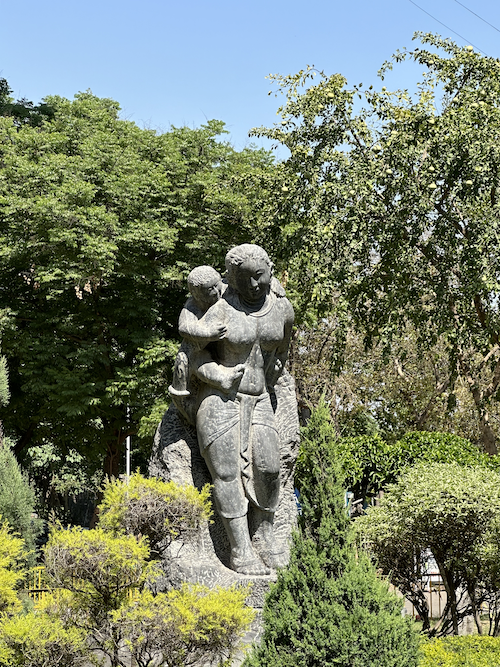Project in India
Investigators: 
International Mentor:
Joseph L. Mathew, MD, PhD, Professor, Department of Pediatrics,
Postgraduate Institute of Education and Research, Chandigarh, India
University of Michigan Mentor:
Matthew L. Boulton, MD, MPH, Department of Epidemiology, School of Public Health, and, Department of Internal Medicine, Infectious Diseases Division, Medical School, University of Michigan
Candidates at the Masters and PhD levels are welcome to apply for one of the following research projects:
Research Project Areas
- Ongoing primary research related to childhood vaccination for public health.
- Data analysis on completed primary research work related to childhood vaccination, community acquired pneumonia, healthcare behavior pattern.
- Ongoing primary clinical research work with a focus on public health (cystic fibrosis, tuberculosis, other respiratory illnesses).
- Secondary research work (systematic reviews, evidence appraisal, guideline appraisal) related to public health in developing countries.
- Students are also welcome to propose their own ideas for short-term research. However, such proposals should be discussed at least six months in advance, in order to obtain appropriate local approvals.
Facilities available with the host:
- Networking with field sites (known as anganwadis) that have access to children and families in the community.
- Basic laboratory facilities with a PCR machine, ELISA reader, Biosafety cabinet, etc.
- Data from previous and current projects for analysis.
- Assistance of research personnel working in various projects.
Suggested literature:
- Bettampadi D, Carlson BF, Mathew JL, Impact of Multiple Risk Factors on Vaccination Inequities-Analysis of Indian Infants over 2 Decades, Am J Prev Med 2021; 60(1S1): S34-S43. DOI: 10.1016/j.amepr.2020.10.001.
- Mathew JL, Mittal SK, Vaccination Inequities in India: Current Status and the Way Forward, Am J Prev Med; 2021; 60(1S1): S4-S10.
- Bettampadi D, Power L, Sen A, Lepkowski J, Boulton ML, Vaccination Inequality in India, 2002-2013, Am J Prev Med; 2020 Oct 20:S0749-3797(20)30403-7. doi.org/10.1016/j.amepre.2020.06.034 PMID: 33097336.]
- Shrivastwa N, Gillespie BW, Kolenic GE, Lepkowski JM, Boulton ML. Predictors of Vaccination in India for Children Aged 12-36 Months. Vaccine. 2015; 33:D99-D105. PMID: 26615176.
- International Institute for Population Sciences (IIPS) and ICF. 2017. National Family Health Survey (NFHS-4), 2015-16: India. Mumbai: IIPS. Available from: http://rchiips.org/NFHS/NFHS-4Reports/India.pdf. Accessed: 05 October 2018.
- Shenton LM, Wagner AL, Bettampadi D, Masters NB, Carlson BF, Boulton ML. Factors Associated with Vaccination Status of Children Aged 12–48 Months in India, 2012–2013. Matern Child Health J 2017. DOI:10·1007/s10995-017-2409-6.
- Shrivastwa N, Gillespie BW, Lepkowski JM, Boulton ML. Vaccination Timeliness in Children under India’s Universal Immunization Program. Pediatr Infect Dis J 2016; 35: 955–60.
- Mathew JL. Inequity in Childhood Immunization in India: A Systematic review. Indian Pediatr 2012; 49: 203-223.
- Mathew JL. Evidence-Based Options to Improve Routine Immunization. Indian Pediatr 2009; 46: 993-996.
About the Host Site and Location:
Chandigarh is a small, compact city well connected to larger Indian cities by air, rail, and road. It also has limited international flights. It rests at the foothills of the Himalaya mountains and is scenic. Chandigarh is easy to navigate, bicycle-friendly, and has many comfortable accommodation options suiting a range of budgets. The best times of year to be in Chandigarh are February-March and October-December. During the peak of summer, peak temperatures can soar to 100-110 degrees F (dry heat).
The Postgraduate Institute of Medical Education and Research (PGIMER) Chandigarh is a 2100 bed, extremely busy, tertiary-care, postgraduate teaching hospital. The Advanced Pediatrics Centre where the host is based is a multi-specialty childrens' hospital, with community and social outreach. This makes it ideally suited for clinical as well as public health research in child health. The institution has a Memorandum of Understanding with the University of Michigan for collaboration in research projects, student visas, and academic areas of mutual interest.
A note about the host:
Joseph L. Mathew is a Professor of Pediatric Pulmonology at the Advanced Pediatrics
Centre at PGIMER Chandigarh. His academic and research activities revolve around (i)
pediatric respiratory diseases (notably community acquired pneumonia, tuberculosis,
cystic fibrosis, bronchial asthma, etc); (ii.) vaccines/immunization of public health
importance; (iii) evidence-based healthcare (systematic reviews, health technology
assessment, guideline development); and (iv) biomedical innovation.
